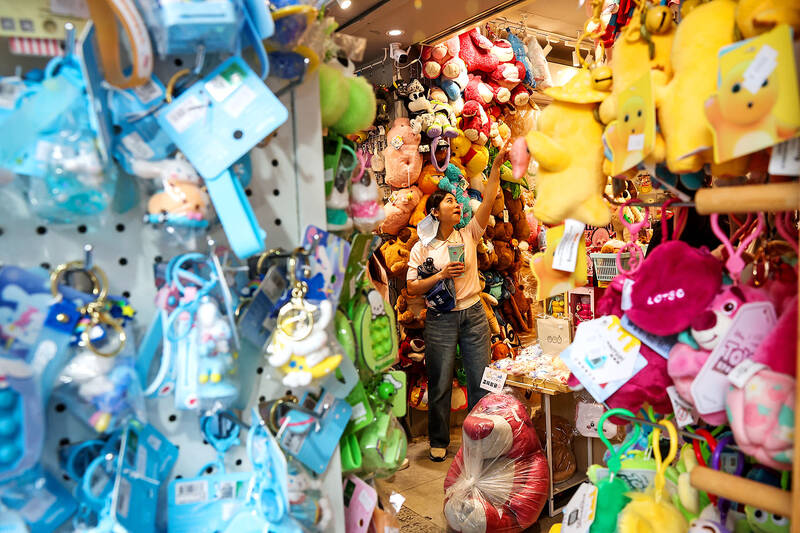Consumer confidence improved this month, signaling a tentative return of optimism across economic expectations, equity market sentiment and spending intentions, even as concerns about slowing growth and lingering inflation persist, a survey released yesterday by Cathay Financial Holding Co (國泰金控) showed.
The proportion of respondents expecting the domestic economy to grow over the next six months rose to 19.3 percent, up from the previous month, following the National Development Council’s latest business signal flashing “yellow-red” — typically interpreted as a sign of expansion, the survey said.
However, uncertainty remains high. More than half of the survey’s 12,718 respondents — polled online from June 1 to June 7 — said that they believe conditions could deteriorate amid continued global volatility, including US tariff adjustments and geopolitical risks.

Photo: CNA
Despite the cautious tone, appetite for consumer spending improved. Interest in purchasing big-ticket items nudged higher and plans to acquire durable goods ticked up, it said.
Nonetheless, a greater proportion of consumers still intend to reduce their budget, highlighting a prevailing conservative stance.
Sentiment remained muted on housing. A growing number of people indicated plans to sell property rather than buy, it said, as expectations for a market rebound remain low.
The central bank has shown no intention of loosening mortgage restrictions, even as the number of transactions falls.
The central bank on Thursday said it would refrain from additional tightening, adding that earlier rounds of credit controls had already tempered lending and cooled price expectations.
Overall, households remain guarded, despite the Directorate-General of Budget, Accounting and Statistics forecasting GDP growth of 3.1 percent and inflation of 1.88 percent for this year.
Notably, 63 percent of respondents expect growth to fall below 3 percent, while 68 percent anticipate inflation exceeding 2.3 percent, underscoring persistent anxiety over rising living costs, the survey found.
Stock market sentiment brightened slightly, buoyed by a temporary easing in US-China trade tensions. About 25 percent of respondents said they plan to increase their equity holdings, compared with 23.5 percent who intend to sell.
Additionally, 31.5 percent believe the TAIEX would rise over the next six months, while 37 percent anticipated a decline — the most upbeat sentiment reading this year, it said.
Exchange-traded funds continue to be a cornerstone of investment strategies, the survey showed. Nearly half of respondents plan to maintain their current holdings for another 12 months, while 42 percent expect to increase their exposure. Only 10 percent expressed intentions to reduce positions that have lost value due to the sharp appreciation of the New Taiwan dollar against the US dollar, and other adverse market movements, it said.
Looking ahead, US trade policy remains a key variable. About half of respondents cited US President Donald Trump’s tariffs and tax policies as the most important factor influencing bond prices, they survey showed.
Other key drivers include macroeconomic indicators from both Taiwan and the US, US Federal Reserve policy decisions and exchange rate fluctuations, it showed.

Meta Platforms Inc offered US$100 million bonuses to OpenAI employees in an unsuccessful bid to poach the ChatGPT maker’s talent and strengthen its own generative artificial intelligence (AI) teams, OpenAI CEO Sam Altman has said. Facebook’s parent company — a competitor of OpenAI — also offered “giant” annual salaries exceeding US$100 million to OpenAI staffers, Altman said in an interview on the Uncapped with Jack Altman podcast released on Tuesday. “It is crazy,” Sam Altman told his brother Jack in the interview. “I’m really happy that at least so far none of our best people have decided to take them

DIVIDED VIEWS: Although the Fed agreed on holding rates steady, some officials see no rate cuts for this year, while 10 policymakers foresee two or more cuts There are a lot of unknowns about the outlook for the economy and interest rates, but US Federal Reserve Chair Jerome Powell signaled at least one thing seems certain: Higher prices are coming. Fed policymakers voted unanimously to hold interest rates steady at a range of 4.25 percent to 4.50 percent for a fourth straight meeting on Wednesday, as they await clarity on whether tariffs would leave a one-time or more lasting mark on inflation. Powell said it is still unclear how much of the bill would fall on the shoulders of consumers, but he expects to learn more about tariffs

PLANS: MSI is also planning to upgrade its service center in the Netherlands Micro-Star International Co (MSI, 微星) yesterday said it plans to set up a server assembly line at its Poland service center this year at the earliest. The computer and peripherals manufacturer expects that the new server assembly line would shorten transportation times in shipments to European countries, a company spokesperson told the Taipei Times by telephone. MSI manufactures motherboards, graphics cards, notebook computers, servers, optical storage devices and communication devices. The company operates plants in Taiwan and China, and runs a global network of service centers. The company is also considering upgrading its service center in the Netherlands into a

Taiwan’s property market is entering a freeze, with mortgage activity across the nation’s six largest cities plummeting in the first quarter, H&B Realty Co (住商不動產) said yesterday, citing mounting pressure on housing demand amid tighter lending rules and regulatory curbs. Mortgage applications in Taipei, New Taipei City, Taoyuan, Taichung, Tainan and Kaohsiung totaled 28,078 from January to March, a sharp 36.3 percent decline from 44,082 in the same period last year, the nation’s largest real-estate brokerage by franchise said, citing data from the Joint Credit Information Center (JCIC, 聯徵中心). “The simultaneous decline across all six cities reflects just how drastically the market